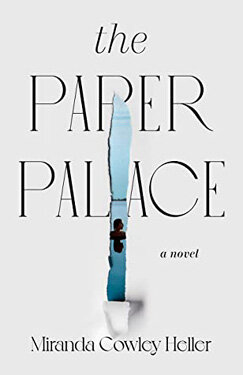Recently I was sorely disappointed by the novel “The Hummingbird” which tells the story of a married man who has never been able to be with the true love of his life. I was reminded how much the structure of a novel can really impact how successfully it conveys its subject when reading Miranda Cowley Heller's emotionally-intelligent first novel “The Paper Palace” because the central story is the same as Veroensi's but much more effective. Elle Bishop is a happily married wife and mother staying at her family's summer camp in Cape Cod. On the evening before the book's opening chapter, she finally had sex with Jonas, a man she's been in love with since she was a teenager but who she's not been able to be with for complicated reasons. We follow the fallout of this over a 24 hour period while getting the story of her difficult family life and events leading up to this disarming experience. We also come to understand the dark secret which simultaneously binds her to Jonas and keeps them physically apart. It's an absorbing and evocative story that realistically details the foibles and frailties of its characters in a way that made me fall for them and deeply care about the testing dilemmas that they face.
Each chapter feels perfectly measured to show how the small details happening in the present day are impacted by the past. It's compelling how we come to understand the dynamics of Elle's relationship to her mother, her husband Peter and Jonas as the novel progresses. Though the story is told in Elle's voice, I understood all the characters' points of view and felt sympathetic towards them even if I didn't necessarily agree with the choices they make. This gradually builds upon the meaning of the intense encounter which proceeds the novel's opening and creates a tension concerning what Elle will do now that she and Jonas have turned their intense feelings for each other into a physical expression. I was particularly taken with Elle's mother who is such a complex, opinionated and peevish individual. It's totally understandable that Elle would find her difficult and irritating, but she's the kind of forthright individual who is wonderfully entertaining to read about. Although I was a little skeptical about some of British dialogue from Englishman Peter, it felt realistic how he has an easy and affable relationship with his mother-in-law which Elle can never achieve.
Being from New England, I particularly appreciated the way the author beautifully writes about the natural environment of this summer camp and how the structure of this rural community changes over time. There's something endearing about Elle's deep affection for this location despite the painful memories associated with it. The novel also movingly describes the twisted structures of sexual abuse and the poisonous way these occurrences can become secretly weaved into a family's life. It feels like this story offers a new point of view about this difficult subject matter so it's a thought provoking as well as a heartfelt book. I was also completely absorbed by its humour, sensuality and well-judged narrative tension. Given that the author works on different TV Drama Series and that this debut has been snapped up as a Reese Witherspoon choice, it seems likely that this novel will get a screen adaptation. Often reviewers can be snippy about how novels can sometimes feel like they were written only for this purpose, but I think the innovative structure of this book which is perfectly suited to its story makes it an utterly compelling read.
























